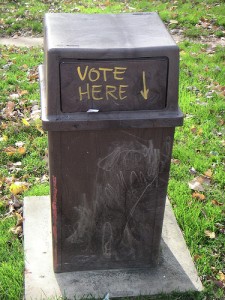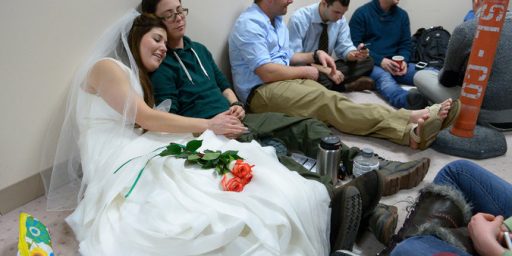Senate Passes DC Voting Bill
 Steven Taylor and I are basically of the same mind on the recent passage by the Senate of a bill to give voting representation in the U.S. House of Representatives to residents of the District of Columbia. I’ve written numerous times over the past six years, so one can consult my DC category archives for much more.
Steven Taylor and I are basically of the same mind on the recent passage by the Senate of a bill to give voting representation in the U.S. House of Representatives to residents of the District of Columbia. I’ve written numerous times over the past six years, so one can consult my DC category archives for much more.
With respect to this particular attempt, my main gripe is that our representatives seem to have totally abrogated their obligation to follow the Constitution. Whatever one’s views on the merits of DC citizens having voting rights in Congress, it’s inarguable that the Constitution reserves that privilege to residents of the several states; that’s why we amended the Constitution to give DC three Electors for presidential elections.
One amusing side effect of this charade could be to give Utah and extra vote. The Supreme Court will surely strike down the Member for DC for reasons already stated. But the bill in question gives Utah an extra Member so as to assuage Republicans worried about adding a safe Democratic seat to the legislature. Unless there’s a non-severability clause in the bill, then, the short-term impact could be to add a Utah seat and not one for the District.
Photo by Flickr user Daquella Manera under Creative Commons license.






What’s the argument against retrocession? Other than that Eleanor Holmes Norton isn’t a shoe-in then?
If the people who live in DC want a vote, then the real answer is for DC to go back to Maryland except for the capital, Mall area.
Retrocession, real or virtual, has long struck me as the proper the solution. The problem is that neither DC nor Maryland seems to want it.
Why Utah and not some normal conservative state?
After the last census, Utah narrowly lost out on being given another congressional seat. It instead went to North Carolina.
Re Maryland, I dunno. According to the wiki page, DC appears never to have been a part of Maryland, or Virgina, for that matter:
The Territory of Columbia was an entity entire unto itself, if I read that correctly.
Do you really want to put the seat of the Federal Government under the legal jurisdiction of only one of it’s member states?
Partial retro-cession, to shrink the size of the district, wouldn’t create this dilemma, and would be my preference.
It may be unconstitutional. Art. I, Sec. 8, Para 17 gives Congress exclusive authority over that which is designated the Seat of Government.
In a number of disputes between Congress and the local home rule government, the SCOTUS has made clear that the Congress can delegate its power, but it always maintains the right to reclaim it. For example, Congress might delegate to the city council the authority to enact gun laws, but it can always take that back. Similarly, if Congress authorized retrocession, could the next Congress take it back?
Advocates of statehood or retrocession avoid this issue by reducing the size of the Seat of Government.
It was created from land ceded by Maryland and Virginia for the purpose of creating the Federal District. Virginia took its half back a few years later.
Every retrocession plan I’ve seen calls for leaving a non-residential rump consisting of the area around the Mall and including the White House, Capitol Hill, and the Supreme Court.
The territory was created on lands that originally belonged to Maryland and Virginia in 1790.
That quote is just saying that the federal “territory” of Columbia, and the “city” of Washington within it were merged into a single entity in 1871.
Then you would still force representatives in the federal government to reside under the laws of member states that are not their own.
Most of them live in Northern Virginia or Maryland as it is.
And regarding Utah, that ‘bonus’ seat would only be in play for the 2010 cycle (UT-AL?) so unless anyone is projecting a repeat of 1994 with a partisan swing of 40 to 50 House Seats, that is an almost irrelevant seat.
With regard to retrocession (and all arguments I have seen are what James Describes with the Mall and surrounding buildings staying as an independent district). I have gotten arguments that retrocession would be impossible because of the size of the city.
I am not convinced it would be as difficult as some claim-but I don’t live in the area. Is it impossible? Is this just an argument against retrocession because others either want representation in the house or statehood?
Fester I agree that the Utah seat is mostly meaningless-I think more to pacify/garner votes from the GOP side.
However, I do suspect some blue states are going to lose seats after the 2010 census. It is pretty much known that a lot of blue states are bleeding citizens. I don’t think this means anything all that exciting for red states if those citizens fled to them though. NH has pretty much learned that people fleeing Mass into NH don’t change their voting patterns and just end up trying to turn their new state into a blue state.
Are we going to start giving our territories electoral votes too?
The arguments against partial retrocession based upon the original understanding of the Framers are twofold:
1. The federal government needs plenary power and control over its own security; it should not be dependent upon state government. See Philadelphia during the Constitutional Convention. See Maryland during the Civil War.
2. Failing to set aside a district in which federal offices will be built and maintained will set off the jealousies of the various states. Each will want their fair share of federal offices, potentially reducing the efficiency of federal government.
Maybe circumstances have changed, but I think both of these considerations tend to favor a larger rump left for the Seat of Government.
On a more practical note, James, what is the tax base of the District of Columbia?
With so much government property and employment which is non-taxable, with so much income/assets that could be relocated across state lines, I wonder if D.C. would be a solvent enterprise or if it assumes wealth transfers from the federal government which would be IMO far less likely in any change.